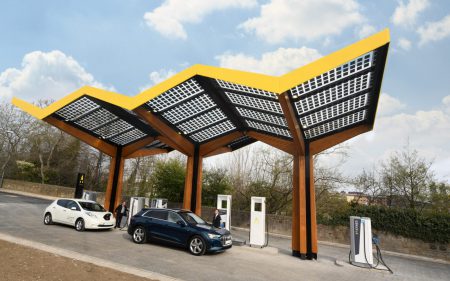Boris Johnson has set out plans for green investment over the coming decade, including a target to generate enough offshore wind to power every home in the UK and a ban on new petrol and diesel cars and vans from 2030.
The prime minister’s long-awaited 10-point plan for a “green industrial revolution” also promised the UK’s first hydrogen-powered town, four carbon capture “clusters” to suck 10 megatons of carbon dioxide out of the atmosphere and a new generation of advanced nuclear reactors.
But green campaigners warned that the £12bn in public funding promised by Mr Johnson fell well short of the scale of ambition needed, while there was dismay at his inclusion of “pie-in-the-sky” plans for zero-emission jet planes.
The decision to bring forward by five years the phase-out date for polluting cars and vans – with new hybrids granted a stay of execution until 2035 – is designed to kick-start the electric vehicle (EV) market, which despite recent growth still accounts for just 7 per cent of the sector in the UK.
It was backed by new investment of £1.3bn to instal charge points in homes, streets and motorways across England in a bid to overcome consumer reluctance to adopt the cleaner technology.

Environmentalists hailed the move as a breakthrough which Greenpeace said could “put the government back on track to meeting its climate commitment” of net-zero carbon emissions by 2050.
It puts pressure on other countries to follow suit ahead of the COP26 UN climate change summit hosted by the UK in Glasgow next year, and will send a signal to manufacturers to invest in production of greener models.
But the CBI warned the new target date was “undoubtedly challenging” and would require support for the automotive sector to adapt.
Coming as the PM attempts to “reset” his government following the fractious departure of aide Dominic Cummings, Mr Johnson’s plan aimed to target investment at former industrial heartlands in the Midlands, north of England, Scotland and Wales which he has promised to “level up” with the prosperous south.
The PM claimed the programme could create and support up to 250,000 high-skilled green jobs and leverage in more than £36bn in private sector investment over the next 10 years. He said: “Although this year has taken a very different path to the one we expected, I haven’t lost sight of our ambitious plans to level up across the country. My 10-point plan will create, support and protect hundreds of thousands of green jobs, whilst making strides towards net zero by 2050.
“Our green industrial revolution will be powered by the wind turbines of Scotland and the northeast, propelled by the electric vehicles made in the Midlands and advanced by the latest technologies developed in Wales, so we can look ahead to a more prosperous, greener future.”
But shadow business secretary Ed Miliband warned that the funding announced “doesn’t remotely meet the scale of what is needed to tackle the unemployment emergency and climate emergency we are facing”, paling in comparison to the tens of billions committed by France and Germany or the £30bn of capital investment in low-carbon sectors demanded by Labour over the next 18 months.
“Only a fraction of the funding announced today is new,” said Mr Miliband. “We don’t need rebadged funding pots and reheated pledges, but an ambitious plan that meets the scale of the task we are facing and – crucially – creates jobs now.”
And Green Party co-leader Jonathan Bartley said Mr Johnson should be aiming for billions more investment and millions of green jobs.
“Any action to address climate change is welcome, but this is nowhere near the scale or speed of what is needed,” he said. “This 10-point plan is essentially business as usual, with a few half-hearted measures and some wishful thinking about pie-in-the-sky technologies such as Jet Zero which don’t even exist yet.”
Read more: Independent
It’s Time to Go Green!
If you would like to know more about Solar Panels and the PowerBanx range of home battery systems, and get a free instant quote, please complete our online form:

